Jewish Folktales and Talmudic Stories (Page 7) |
If you wish to purchase any of these books, click on either the title or the book cover to be directed to Amazon.com. As a warning, I have put up pictures of the book covers to give you somewhat an idea of the style of each book (I know, I know. "Don't judge a book by its cover") so the pages may load slowly, depending on the speed of your internet connection.
If this page came up without frames, Click here to see the complete website
Other Pages of Interest:
Jewish Folktales and Talmudic Stories for Children
(Page 1)
(Page 2)
(Page 3)
(Page 4)
(Page 5)
(Page 6)
(Page 7)
Easy Reader and Picture Books:
Jewish Children's Books (General) |
Jewish Board Books |
Biblical Stories for Children |
Jewish Holiday Books |
Jewish Family Cookbooks |
Jewish Folktales and Talmudic Stories for Children
(Page 1)
(Page 2)
(Page 3)
(Page 4)
(Page 5)
(Page 6)
(Page 7)
|
Jewish Life Books (Mitzvot, Keeping Kosher, etc.) |
Jewish Life Cycle Books |
Family Haggadahs |
Children's Prayerbooks |
Introductory Hebrew Books |
Jewish History and Historical Fiction Picture Books |
Israel Books
Middle School and YA Books:
Bar Mitzvah Books |
Jewish Fiction |
Historical Fiction |
Torah Study |
Prayer and Jewish Life Books |
Jewish Holidays |
Jewish Biographies |
Jewish History Books |
Holocaust Books for Teens |
Israel Books
Jewish Books for Children |
Bar Mitzvah Books |
Jewish Parenting Books |
Jewish Music for Children |
Jewish Videos |
Jewish Toys and Gifts |
Jewish Gift Baskets and Gourmet Food |
Jewish Jewelry |
Amazon.com Coupons, Promotions, and Sales
If this page came up without frames, Click here to see the complete website
Other Pages of Interest:
Jewish Folktales and Talmudic Stories for Children
(Page 1)
(Page 2)
(Page 3)
(Page 4)
(Page 5)
(Page 6)
(Page 7)
Easy Reader and Picture Books:
Jewish Children's Books (General) |
Jewish Board Books |
Biblical Stories for Children |
Jewish Holiday Books |
Jewish Family Cookbooks |
Jewish Folktales and Talmudic Stories for Children
(Page 1)
(Page 2)
(Page 3)
(Page 4)
(Page 5)
(Page 6)
(Page 7)
|
Jewish Life Books (Mitzvot, Keeping Kosher, etc.) |
Jewish Life Cycle Books |
Family Haggadahs |
Children's Prayerbooks |
Introductory Hebrew Books |
Jewish History and Historical Fiction Picture Books |
Israel Books
Middle School and YA Books:
Bar Mitzvah Books |
Jewish Fiction |
Historical Fiction |
Torah Study |
Prayer and Jewish Life Books |
Jewish Holidays |
Jewish Biographies |
Jewish History Books |
Holocaust Books for Teens |
Israel Books
Jewish Books for Children |
Bar Mitzvah Books |
Jewish Parenting Books |
Jewish Music for Children |
Jewish Videos |
Jewish Toys and Gifts |
Jewish Gift Baskets and Gourmet Food |
Jewish Jewelry |
Amazon.com Coupons, Promotions, and Sales
Other Pages of Interest:
Jewish Folktales and Talmudic Stories for Children
(Page 1)
(Page 2)
(Page 3)
(Page 4)
(Page 5)
(Page 6)
(Page 7)
Easy Reader and Picture Books:
Jewish Children's Books (General) |
Jewish Board Books |
Biblical Stories for Children |
Jewish Holiday Books |
Jewish Family Cookbooks |
Jewish Folktales and Talmudic Stories for Children
(Page 1)
(Page 2)
(Page 3)
(Page 4)
(Page 5)
(Page 6)
(Page 7)
|
Jewish Life Books (Mitzvot, Keeping Kosher, etc.) |
Jewish Life Cycle Books |
Family Haggadahs |
Children's Prayerbooks |
Introductory Hebrew Books |
Jewish History and Historical Fiction Picture Books |
Israel Books
Middle School and YA Books:
Bar Mitzvah Books |
Jewish Fiction |
Historical Fiction |
Torah Study |
Prayer and Jewish Life Books |
Jewish Holidays |
Jewish Biographies |
Jewish History Books |
Holocaust Books for Teens |
Israel Books
Jewish Books for Children |
Bar Mitzvah Books |
Jewish Parenting Books |
Jewish Music for Children |
Jewish Videos |
Jewish Toys and Gifts |
Jewish Gift Baskets and Gourmet Food |
Jewish Jewelry |
Amazon.com Coupons, Promotions, and Sales
Easy Reader and Picture Books:
Jewish Children's Books (General) | Jewish Board Books | Biblical Stories for Children | Jewish Holiday Books | Jewish Family Cookbooks | Jewish Folktales and Talmudic Stories for Children (Page 1) (Page 2) (Page 3) (Page 4) (Page 5) (Page 6) (Page 7) | Jewish Life Books (Mitzvot, Keeping Kosher, etc.) | Jewish Life Cycle Books | Family Haggadahs | Children's Prayerbooks | Introductory Hebrew Books | Jewish History and Historical Fiction Picture Books | Israel Books
Middle School and YA Books:
Bar Mitzvah Books | Jewish Fiction | Historical Fiction | Torah Study | Prayer and Jewish Life Books | Jewish Holidays | Jewish Biographies | Jewish History Books | Holocaust Books for Teens | Israel Books
Jewish Books for Children | Bar Mitzvah Books | Jewish Parenting Books | Jewish Music for Children | Jewish Videos | Jewish Toys and Gifts | Jewish Gift Baskets and Gourmet Food | Jewish Jewelry | Amazon.com Coupons, Promotions, and Sales
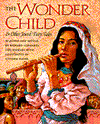 The Wonder Child: And Other Jewish Fairy Tales By Howard Schwartz and Barbara Rush |
Eight tales from Ashkenazic and Sephardic traditions reveal both similarities
to familiar European motifs and differences that highlight the stories' Jewish origins.
In the title selection, an Egyptian variant of "Snow White" and "Sleeping Beauty," a
rabbi and his wife pray for a child on Shavuoth. "The Long Hair of the Princess" is
a Libyan tale with the familiar motif of a princess having to choose her husband
from among seven deserving suitors. The importance of good deeds is stressed
in "The Black Cat," a story from Morocco. Another tale with a Biblical flavor is
"The Forest Witch" from Eastern Europe, which reinforces the sanctity of marriage
vows. The giant Og makes an appearance in "The Tailors and the Giant," also from
Eastern Europe, which explains the origin of tailors' pale faces. The three concluding
stories feature more otherworldly characters: "The Rabbi Who Became a Werewolf"
and "The Peddler and the Sprite" from Eastern Europe, and "The Purim Dybbuk"
from Morocco. Lovely, full-page, full-color illustrations and spot art enhance the
mood of the text. Detailed notes provide sources and groupings, and a brief
glossary explains the Hebrew and Yiddish words used. A solid collection with
magic, mystery, and humor.
|
 The Woodcutter's Coat By Ferida Wolff |
A woodcutter buys a ine, heavy coat with a thick fur collar and five round
buttons,which keeps him warm until, with much use and little upkeep, it
begins to fall apart. A thief steals the tattered coat, and it passes from owner
to owner, eventually coming back to its original possessor -- but looking
brand-new. Entertaining illustrations depict good-humored folk and sly
details in this circular tale.
|
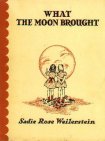 What the Moon Brought By Sadie R. Weilerstein |
The 17 stories in this 1968 book feature Ruth and Debbie--two sisters who were not quite twins, and both had pointy chins, from always looking up at the moon. Once a month, their mother let them stay up to look at the new moon that was like a silver cradle. Sometimes it sailed out of a cloud, rose from behind tall buildings or peeked from behind the branches of a tree. And once it rose out of the sea. But wherever the new moon came from, it brought the Jewish holidays, and the sisters greeted it with "Shalom Aleichem!" (Peace welcome!)
|
 Wise Little Judge By David Shalom Pape |
David Shalom Pape is best known for his stories in a children's magazine, "The Moshiach
Times." Now he has selected 17 stories for children and presented
this Torah Literature in enjoyable, readable style for young people. His selections are
divided into chapters: Holiday tales, from the days of the Baal Shem Tov, Torah giants
and moments in history. Not only are all of the tales interesting and exciting, but they are
illustrated by three talented artists which add to the interpretations of the stories. ...
|
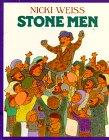 Stone Men By Nicki Weiss |
Nestled happily on his grandma's lap, Arnie listens to the story
the woman tells of long ago. It's about Isaac the peddler, who
pushes his cart from village to village, selling "knickknacks,
doodads, and gewgaws." As he travels the lonely road, he often
stops to build a large stone man, decorating it with a fallen
branch or an old hat. The figure keeps him company until it is
out of sight, and then he builds another. A few days before
Passover, Isaac overhears a group of the czar's soldiers planning
to ransack a village. Unable to awaken the tired townspeople, he
embarks on a plan of his own. The next morning, the surprised
villagers watch the soldiers gallop away in confusion. Looking
to the hillside, they see an impressive army of stone men and
immediately know who to thank.
By framing this tale in a storytelling scenario, Weiss creates a comfortable mood for her narrative. The language is direct and dramatic, giving the story the cadence of a family tale passed from one generation to the next. The pastel and colored-pencil paintings have a quiet texture, creating a homespun look that works well with the text. Uncluttered illustrations in deep brown and greens evoke Isaac's lonely landscape, while bright pastels and a checkered frame differentiate present-day scenes and reflect the warm affection between Arnie and his grandma. Characters have simple, almost cartoon features that are appealingly expressive. While historical events and use of words like "dybbuk" give this tale a distinctly Jewish flavor, this story of quiet heroism will appeal to all children. |
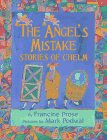 The Angel's Mistake : Stories of Chelm By Francine Prose |
The team behind Dybbuk
(1996) have collaborated on a winsome story
set in the legendary town of Chelm, charting its origins to the angel carrying a bag of
"stupid souls'' and mistakenly spilling them all in one town. Prose recounts many of the
exploits in which "the wise men and women . . . put their brilliant minds together and
solve their problems.'' Whether it's going barefoot in the snow to keep their shoes
from getting wet or wearing their hats upside down to keep them dry, the people of
Chelm are full of ideas. A need to light up the night leads the townspeople to set a
fire and to then call upon the firemen who smother the flames with logs. The town
burns down and the fools of Chelm are disbursed, just as "the angels had intended.''
Podwal's sly yet strikingly beautiful gouache and colored-pencil paintings, using impressionistic brush strokes and skewed perspectives to render the travails of the fools, are a perfect foil for Prose's understated, humorous narrative. Families will find this is a savory treat for sharing. |
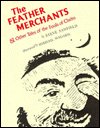 The Feather Merchants and Other Tales of the Fools of Chelm By Steve Sanfield |
A slight variation on the moon theme is one that is delightfully developed in Sanfield's very funny collection. Here it is 2 brothers who are eager to get-rich-quick and believe that they can capture the moon in a barrel of water and them rent it out to the villagers for big bucks. Even Chelmites aren't that foolish. This is an excellent read-aloud for Grades 3 to 8.
|
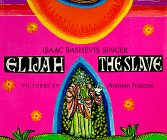 Elijah the Slave By Isaac Bashevis Singer |
A Hebrew legend is retold in this picture book. In order to
rescue a scribe named Tobias from poverty, a messenger from
God named Elijah sells himself as a slave in the marketplace.
|
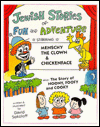 Jewish Stories of Fun and Adventure : Starring Menschy the Clown and Chickenface & Noony, Foofy, and Cooky By David Sokoloff |
An introduction to the wonderful heritage of stories that have
been told from generation to generation over the centuries. Retold
and illustrated for the very young, this entertaining and educational
collection includes best-loved tales from the Bible as well as Jewish
lore.
|
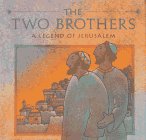 The Two Brothers : A Legend of Jerusalem By Neil Waldman |
The Two Brothers is a quiet tale of sibling love that accounts for the
origins of Jerusalem. The titular two brothers live on opposite sides of a hill,
and each worries that his own life is more bountiful than that of his kin. Wanting
to share the wealth, but without offense or condescension, the brothers take
turns sneaking sheaves of wheat to each other in the darkness. King Solomon
watches with amusement as the brothers' mutual generosity leads to confusion.
Finally, their philanthropic paths cross one night, and the love they feel for each
other causes a miracle to occur. Solomon is inspired to build a temple on the
very spot, and the city of Jerusalem springs up soon after.
Waldman's drawings are simple but lovely; the soft, muted tones lend a warm, dreamlike quality to the legend. His story is equally lucid, reminding readers of the marvelous power of familial love. |
 Strudel, Strudel, Strudel By Steve Sanfield |
Zaynul the school teacher and his wife Zeitel are poor but happy Chelmites
until they develop an uncontrollable craving for strudel. Asleep or awake, they
dream about the sweet treat until Zeitel comes up with a plan. If they each save
just one zloty a week, hiding the coins in an old trunk with wheels, they will be
able to afford the ingredients. After the first week, both husband and wife secretly
decide to let their spouse do the saving. The trunk is finally opened in the spring,
revealing only the two original coins. In the argument that follows, they fall into the
trunk, which rolls down the street and wreaks havoc in the marketplace. In response,
the town leaders use their best Chelm logic to make some new rules: teachers may
not live on a hill, own a trunk with wheels, or eat strudel.
|
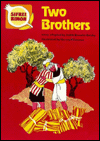
Two Brothers By Judith Belsky |
The well-known tale of lovingkindness and the place where the Temple once stood.
|
 One-Minute Jewish Stories By Shari Lewis |
Twenty stories from various aspects of Jewish life--the Talmud, folklore, the Bible, history - - all in a format for reading in one minute. |
 The Coachman and Other Stories By Gershon Kranzler |
Disguised as a coachman, Rabbi Baruch travels from town
to town in order to further his spiritual understanding.
Along the way he meets many people and realizes the
greatness of simple folk.
|
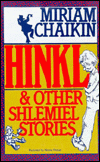 Hinkl and Other Shlemiel Stories By Miriam Chaikin |
Six stories about shlemiels, who resemble the fools of Chelm, but live throughout the world.
|
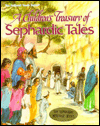 A Children's Treasury of Sephardic Tales By Zvia Ehrlich-Klein |
A delightful treasury of classic Sephardic stories, collected and
presented by Zvia Ehrlich-Klein. Beautifully illustrated by Channa Galitzer.
|